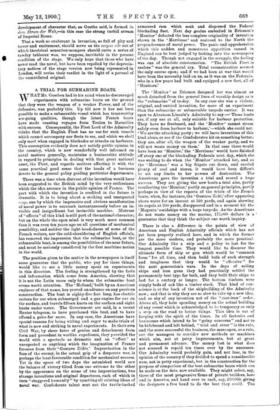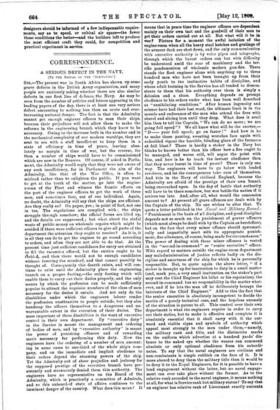A TRIAL FOR SUBMARINE BOATS.
WHAT Mr. Goschen had in his mind when he discouraged experiments with submarine boats on the ground that they were the weapon of a weaker Power, and of the defensive, was probably this. Up till now it has not been possible to make a submersible vessel which has trustworthy sea-going qualities, though the latest French boats have made coasting voyages from Toulon to Marseilles with success. Consequently, the First Lord of the Admiralty thinks that the English Fleet has no use for such vessels which cannot accompany our fleets to sea, and which we shall only meet when engaged in blockades or attacks on harbours. This assumption evidently does net satisfy public opinion in the country, which is now wonderfully well informed on naval matters generally, maintains a businesslike attitude in regard to principles in dealing with that great national asset, the Fleet, and regards matters affecting it with the same practical good sense that the heads of a business devote to the general policy guiding particular departments.
There was a time when distrust of the invention would have been suggested to the British mind by the very enthusiasm which the idea arouses in the public opinion of France. The part with which the invention is credited in the future is dramatic. It is to bring about a striking and unexpected coup, one by which the impressive and obvious manifestation of naval power is to succumb instantaneously before an in- visible and insignificant but invincible machine. Mistrust of "effects" of this kind is still part of the national character; but on the whole the open mind is very much more common than it was even ten years ago on all questions of mechanical possibility, and neither the light-headedness of some of the French writers, nor the cold-shouldering of English officials, has removed the impression that the submarine boat, or the submersible boat, is among the possibilities of the near future, and must be seriously considered by the first maritime nation in the world.
The position given to the matter in the newspapers is itself some guarantee that the public, who pay for these things, would like to see a. little money spent on experiments in this direction. The feeling is strengthened by the facts and information which come from America, showing that it is not the Latin races only to whom the submarine boat seems worth attention. The Holland,' built by an American engineer of that name, has proved an advance on any previous construction. The boat is eighty-five feet long, has electric motors for use when submerged and a gas engine for use on the surface, and travels fifteen knots on the surface and eight knots under water. The Government are said, in a recent Renter telegram, to have purchased this boat, and to have offered a price for more. In any case, the Americans have special reasons for being willing and eager to make trials of what is new and striking in naval experiments. In their own Civil War, by sheer force of genius and detachment from form and precedent in warlike expedients, they provided the world with a spectacle as dramatic and an "effect" as unexpected as anything which the imagination of France foresees from their ' Gustave Zedes.' Improvisation in the face of the enemy, in the actual grip of a desperate war, is perhaps the least favourable condition for mechanical success. Yet in the space of two days the astonished world saw the balance of victory tilted from one extreme to the other by the appearance on the scene of two improvisations, two strange inventions and original departures, each of which in torn "staggered humanity" by upsetting all existing ideas of naval war. Confederate talent sent out the turtle-backed armoured ram which sank and dispersed the Federal blockading fleet. Next day genius embodied in Ericsson's Monitor' defeated the less complete originality of invent ion shown in the • Merrimac' and restored to the North the preponderance of naval power. The panic and apprehension which this sudden and monstrous apparition caused in England can be best judged by looking into the newspapers of the day. Though not engaged in the struggle, the feeling was one of absolute consternation. "The British Fleet is useless " was the general cry. Total reconstruction seemed the only course open; and if we had been at war that would have been the necessity laid on us, as it was on the Federals, who in a few years had built and equipped a new fleet, all of Monitors.'
The ' Monitor' as Ericsson designed her was almost as much detached from the general lines of warship design as is the "submarine" of to-day. In any case she was a violent, original, and untried invention, far more of an experiment than the submarine or submersible torpedo carrier. It was open to Abraham Lincoln's Admiralty to say := These boats are, if any use at all, only suitable for harbour protection. They have no freeboard, and the • Monitor ' cannot steam safely even from harbour to harbour,'—which she could not. ' We are the attacking party ; we will leave inventions of this kind alone, or see if the Confederates hit on something better; they are, after all, the weapon of the weaker party, and we will not waste money on them.' In that case there would have been no 'Monitor,' the Merrimac' would have finished off every one of the blockading Federals next day, which she was waiting to do when the • Monitor ' attacked her, and as the Merrimac' was a big frigate cut down, and carried plenty of coal and stores, it would have been difficult to set any limits to her powers of destruction. The Americans gave the invention a trial and scored a huge success. They are giving the new boats a trial also, partly recollecting the 'Monitor,' partly on general principles, partly perhaps in view of the reports of the trials of the French boats, when, for instance, the Gustave Zeds,' after appearing above water for an instant at 500 yards, and again showing its cupola at 200 yards, disappeared and in a moment hit the ' Magenta 'amidships with a huge torpedo. As the Americans do not waste money on the marine, 175,000 dollars is a • guarantee that they think the subject one worth inquiry.
There is also a difference in the points of view of American and English Admiralty officials which has not yet been properly realised here, and in which the former are the more modern, and probably the more practical. Our Admiralty like a ship and it policy to last for the longest possible time. They would like to discover the ultimate form of ship or gun which would be "common form" for all time, and then build both of such strength and toughness that they would be " effective " for the next generation's wars. In the days of sailing ships and iron guns they had practically settled the permanently best type for both, and they built their ships to last for a century or longer. The bottom timbers were simply beds of oak like a timber stack. That kind of con- science is at the back of the shipbuilding of the Admiralty now ; and that is why they are so slow to take up a new idea, and so shy of any invention not of the "cast-iron" order. Above all, they hate spending money on the actual building of any vessel which is acknowledged to be temporary or only a step on the road to better things. This idea is out of keeping with the spirit of the times. In all factories and businesses which intend to be "going concerns" and not to be hidebound and left behind, "trial and error" is the rule, and the more successful the business, the more open, as a rule, are the managers to consider new methods or machines which aim, not at petty improvements, but at great and permanent advance. The money lost in what does not succeed is repaid ten times over by the successes. Our Admiralty would probably gain, and not lose, in the opinion of the country if they decided to spend a considerable sum, not in petty experiment, but in the construction for the purpose of comparison of the best submarine boats which can be made on the data now available. They might select, say, three of the most progressive firms of private builders, here and in America, and hand over to each, say, £60,000, giving the designers a free hand to do the best they could. The
designers should be informed of a few indispensable require- ments, say as to speed, or cubical air space—the fewer these conditions the better—and the builders left to produce the most efficient craft they could, for competition and practical experiment in service.







































 Previous page
Previous page